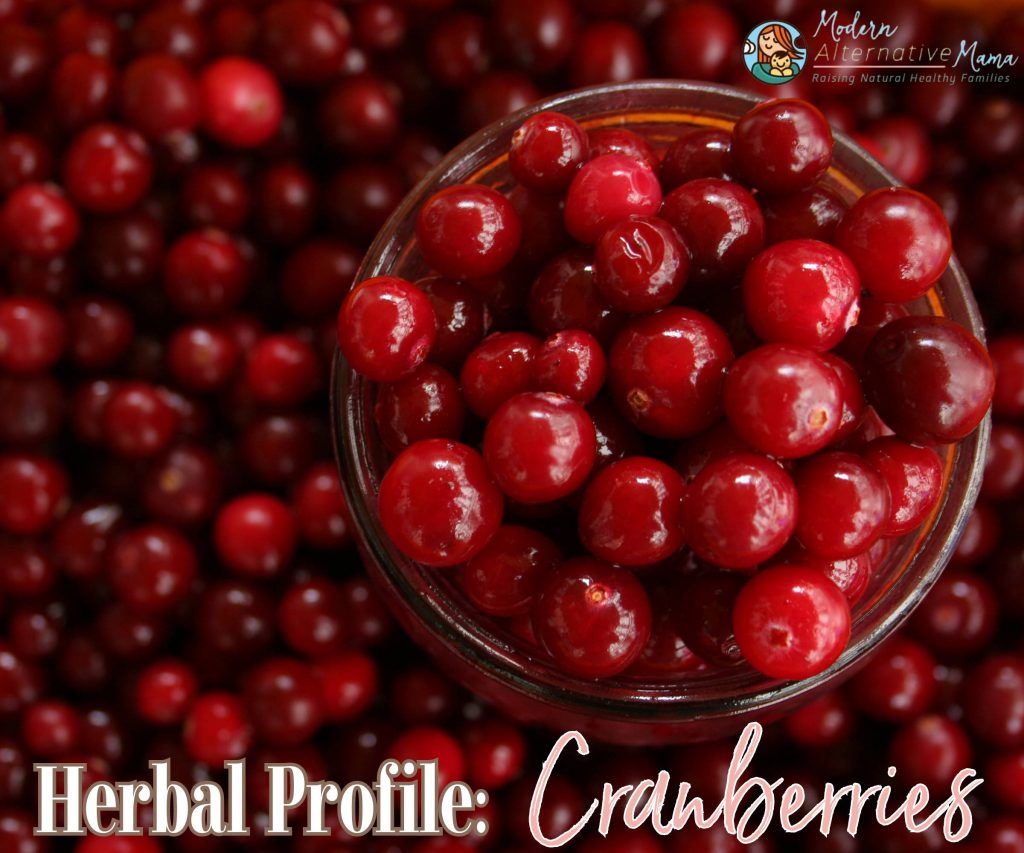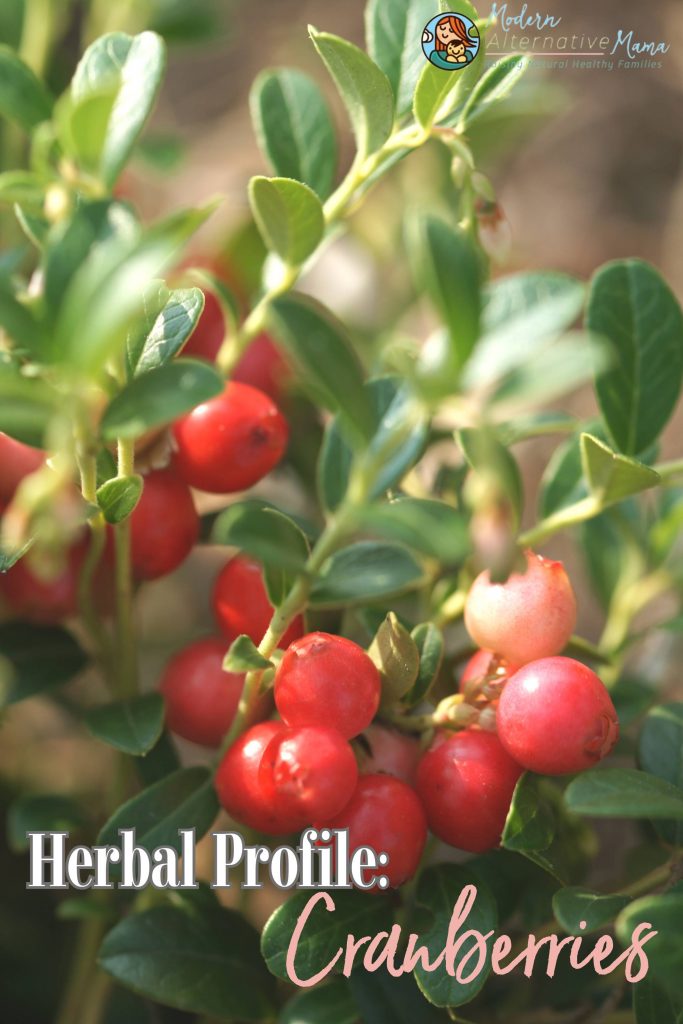What is Cranberries
Cranberries, also called by their scientific name Vaccinium macrocarpon, are a part of the Ericaceae (Heath) family. Cranberries are native to North America and Eurasia. Cranberries are dark red fruits/berries that grow on the branches of a perennial shrub with small, glossy, leathery leaves and clusters of pinkish-white flowers (1). Although cranberries aren’t exactly herbs, that doesn’t mean they can’t be added to herbal remedies!
Health Benefits of Cranberries
Cranberries are most commonly recognized for their urinary tract benefits. Many don’t realize cranberries’ health benefits are far beyond UTI management. Some health benefits of cranberries include:
Rich in Nutrients
Our body needs nutrients to flourish. Without vital vitamins and minerals, our bodies won’t function properly. Raw cranberries contain fiber, calcium, magnesium, phosphorus, potassium, vitamins A, C, and E, and trace amounts of protein, iron, zinc, copper, manganese, and selenium (2). Dried cranberries contain fiber, manganese, phosphorus, potassium, vitamins A, E, and K, and trace amounts of protein, iron, zinc, copper, selenium, and vitamin C (3).
Antioxidant Properties
Antioxidants can help fight damage from harmful free radicals. The buildup of free radicals has been linked to chronic diseases, such as cancer and heart disease (4). Cranberries are a rich source of bioactive compounds and nutritional components, many of which have antioxidant properties (5). For instance, cranberries contain phenolic, flavonoid, and anthocyanin compounds responsible for their robust antioxidant properties (6). Studies revealed consuming high-quality cranberry, whether chronically or acutely, boosts the antioxidant effect (7).
Anti-Inflammatory Properties
Although inflammation is a natural bodily response, chronic inflammation can lead to detrimental health effects. Chronic inflammation has been linked with many diseases, such as type 2 diabetes, asthma, and certain cancers (8). The phytochemicals in cranberries, like anthocyanins, hyperoside, ursolic acid, and corosolic acid, had anti-inflammatory effects on human monocytes (9). In animal studies, dietary cranberry prevented inflammation by suppressing colonic inflammation and alleviating gut microbiota dysbiosis in dextran sodium sulfate-treated mice. The study stated:
“Moreover, cranberry treatment partially reversed the change of gut microbiota in colitic mice by increasing the abundance of potential beneficial bacteria, for example, Lactobacillus and Bifidobacterium, and decreasing the abundance of potential harmful bacteria, such as Sutterella and Bilophila (10).”
If you want to learn more about gut health, check out Earthley’s Gut Health Support Guide.
May Help Manage Stomach Ulcers
Stomach ulcers are open sores that develop on the stomach lining or upper portion of the small intestine due to Helicobacter pylori (H. pylori) or long-term use of nonsteroidal anti-inflammatory drugs (11). Cranberries contain polyphenols that prevent and inhibit H. pylori from attaching to the stomach lining (12,13). Studies indicate regular cranberry juice consumption may be useful in H. pylori management, especially for children (14). Similar findings found adults who drank 500 ml of cranberry juice had reduced H.pylori infections (15).
May Promote Heart Health
Unfortunately, heart disease is the world’s number one cause of death (16). Due to the incredibly complex determinants of heart disease and various possible contributions, it’s hard to pinpoint an exact way to prevent it. Still, you can at least take steps to lower your overall risk. That’s where cranberries may come in.
Cranberries contain compounds that influence their antioxidant effects. Cranberries’ anthocyanins and flavonoids influence heart health outcomes (17,18). In human studies, cranberries increased HDL (good) cholesterol, decreased LDL (bad) cholesterol, and protected LDL cholesterol from oxidation (19,20,21). In other human studies, cranberry products lowered blood pressure levels while decreasing blood vessel stiffness and inflammation (22,23).
May Improve Urinary Tract Health
Urinary tract health is responsible for removing wastes and producing and controlling urine and any disorders or problems that might occur within the tract (24). Thankfully, cranberries have a long history of promoting urinary tract health (25). Human studies demonstrate cranberry juice and supplementation can reduce the risk of urinary tract infections in adults (26,27,28). Similar findings were concluded for children, including preventing recurrent UTIs (29,30). Human studies also found cranberry juice reduced the frequency of bacteriuria and pyuria in older women (31).
May Support Healthy Digestion
The digestion process breaks down food into smaller components that can be absorbed into the bloodstream and turned into nutrition (32). When food isn’t digested properly, digestive troubles like heartburn may occur. Emerging evidence demonstrates cranberries’ positive actions on the gut microbiota (33).
One study noted a shift in the Firmicutes:Bacteroidetes ratio, increased commensal bacteria, and decreased or the absence of bacteria associated with negative health effects (34). Gram-positive Firmicutes and Gram-negative Bacteroidetes are bacteria strains throughout the entire human digestive tract. In blood tests, an optimal 12 to 620 ratio suggests normal, healthy, balanced microbes in the GI tract (35). One study noted:
“Overall, the data indicate that the abundance of Firmicutes in the gut microbiota of healthy individuals varies between 11% to 95% and that of Bacteroidetes between 0.6% to 86.6% (36).”
In other words, cranberries promote a healthy gut. If you want to test your gut health, consider Verisana’s Comprehensive Gut Health Test.
Anticancer Properties
Statistics say that 158.3 of every 100,000 individuals will die from cancer, but what if they didn’t have to (37)? Thankfully, studies note cranberries’ protective effects against cancer (38). In vitro and in vivo studies revealed cranberry compounds inhibited or slowed cancer cell growth (39). One study found cranberries’ proanthocyanidins are selectively cytotoxic to platinum-resistant ovarian cancer cells, hormone-refractory prostate cancer cells, and neuro-blastoma cells but are minimally cytotoxic to lung fibroblasts (40).
Safety Concerns
Although cranberry is commonly consumed in foods, mainstream sources claim there isn’t enough reliable information to know if cranberry is safe to use in larger amounts in children, when pregnant or breastfeeding. They recommend “staying on the safe side and sticking to food amounts.”
They warn cranberry juice and extracts contain a large amount of a chemical called oxalate. Since oxalate is found in kidney stones, cranberry might increase the risk of kidney stones. If you have a history of kidney stones, they suggest avoiding cranberry extract products or drinking large amounts of cranberry juice. Additionally, cranberries contain significant amounts of salicylic acid, similar to aspirin. Those allergic to aspirin should avoid cranberries (41).
Although I couldn’t find any herbalists who spoke on the safety profile of cranberry, one of my herbal books did. The only caution noted is for kidney disease patients (42). Additionally, avoiding cranberries with an aspirin allergy is advised. Aside from those cautions, I’d like to note that cranberries are a food that can be purchased in many grocery stores. To claim a berry with as many documented health benefits as cranberry is potentially unsafe is unrealistic. I could understand if it were a toxic berry, but it is a commonly consumed fruit, and it is completely safe to consume, even for children or while pregnant and breastfeeding.
How to Use Cranberries
You can find cranberries in dried bulk, pills, powders, extracts, or tinctures. Tinctures usually contain the most concentrated amount of herbs. Teas and soups are also options, especially when following Ayurvedic medicine recipes. If you’re a DIY person, some great starter recipes are:
- How to Make an Alcohol Extraction (With Almost Any Herb) – to make a cranberry tincture
- How to Make a Glycerin Extraction (With Almost Any Herb) – to make an alcohol-free cranberry tincture
Follow the recommendations of any supplement; some of my recommendations include:
- Earthley’s Super Foods Powder is a nourishing powder rich in naturally occurring vitamins, minerals, and antioxidants. It can support gut health, immune health, natural energy levels, and hormone balance. Mix it into yogurt or a smoothie for a whole-body boost!
- Earthley’s UT-Relief promotes urinary tract health and relieves symptoms of UTIs. Take it daily as a preventative if you have frequent UTIs or at the first signs of one to reduce pain and other symptoms naturally.
Disclaimer: This post is not intended as medical advice. These statements have not been evaluated by the FDA, and nothing in this post is intended to diagnose, treat, or cure anything. If you have questions, please do your own research or seek advice from a health professional.







